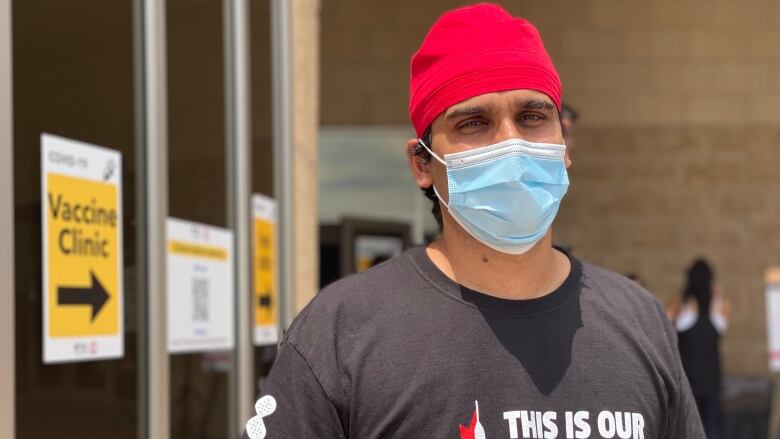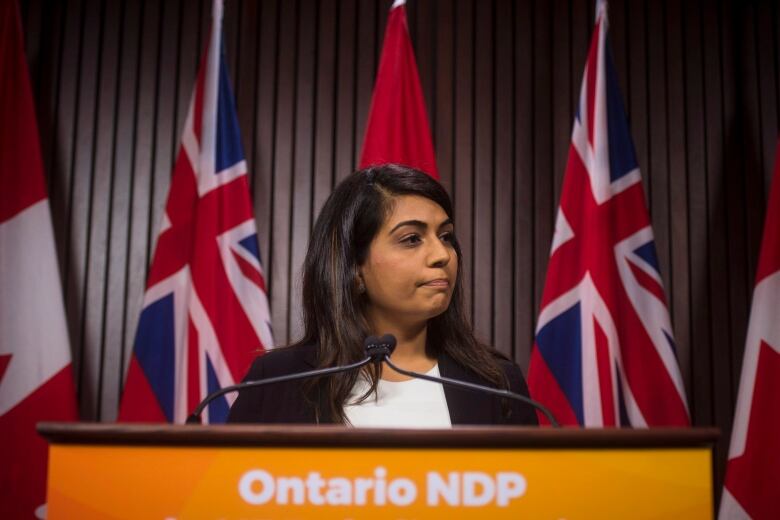Ontario faces pressure to shift COVID-19 vaccine 2nd doses to hot-spot communities
'If we don't take action now, we may have a fourth wave,' Dr. Raj Grewal says

Pressure is growing on the province to develop a new hot-spot vaccination strategy that would send second doses to communities hard-hit by COVID-19to stop the spread of the delta variant and prevent a fourth wave.
On Monday, a Peel Region doctor, a Brampton MPP and the Toronto mayor said it's time for the Ontario government to make second shots in hot-spot areas a priority. That means sending thousands of second doses to postal code areas in certain public health units right away, they said.
A rise in case counts could eventually lead to more shutdowns, they added.
Dr. Raj Grewal, medical director of Embassy Grand COVID-19 testing and vaccination centrein Brampton, said Peel Region is already seeing a rise in cases involving the delta variant. He said the next four weeks are crucial for getting people vaccinated.
"The delta variant we know is more infectious and more transmissible. And we know thatif we don't take action now, we may have a fourth wave in the coming months," Grewal said on Monday.
Grewal said he understands that the Doug Ford government wants to have an equitable distribution of COVID-19 vaccines based on age groups, but said it cannot ignore thepressing needs of hot-spot communities.
"I think we should be cognizant of the fact that we are here in the hardest hit region in the country," he said.
"We are full of essential workers who don't have the luxury of working from home. Most of them come from multi-generational families. We have a huge pocket of international students here that also live in crowded basement apartments. Those factors, I think, we have to take into account."
Grewal said he agrees with Dr. Lawrence Loh, Peel Region's medical officer of health, who said he would like to see Peel residentsget their second doses in the next month. He added he is worried that, as the province begins to open up, there could be a fourth wave with increasing counts of the delta variant if the governmentdoesn't act fast enough.
"We need to get on top of this now. We need to get people vaccinated here in Peel over the next four weeks as much as we can."

Sara Singh, the Ontario NDP deputy leader and MPP for Brampton Centre, said in a statement on Monday thatPremier Doug Ford needs to listen to his scientific experts.
"People need to have confidence that this early reopening won't backfire. In order to guarantee that, the Ford government needs to do what the experts are telling them to do: offer everyone in a hot spot a second dose of the COVID vaccine right now," Singh said.
According to Dr. Barbara Yaffe, Ontario's associate chief medical officer of health, the delta variant is expected to become the dominant strain in the province. Thevariant, known asB.1.617,was first identified in India and has become the fourth variant of concern. One COVID-19 vaccine dose is not as effective against the delta variant as two doses.
Toronto Mayor John Torysaid: "I encourage the federal and provincial governments to consider allocating additional vaccines to hot-spot areas in the province. Being fully vaccinated is more effective in containing the delta variant that poses a risk in hot-spot areas."
'We know where the burden of COVID-19 is'
Dr. Isaac Bogoch, an infectious disease physician based out of Toronto General Hospital, said officials are discussing the issue.
"It's no secret that the vaccine task force and the province and the science table have all been discussing how to operationalize this. I think we're going to hear some details soon," he said.
"I don't think the question is:Shoulddo we do this? I think it's: How is this actually going to play out?"
Bogoch said the concern about the delta variant is that it will get into communitiesthat are under-vaccinated. The strategy shouldtarget individuals at greater risk of having a severe outcome and communities at greater risk of sufferinga severe impact, he said.
As for Brampton, Bogoch said it is a hot spot within a hot spot.
"We know where the burden of COVID-19 is," he said.
The province prioritizedhot spots in late April, which meant sending halfof doses to be administered in 114 provincially-designated postal codes. Ontario reverted back to a per capita distribution schedule in mid-May.
Speaking an afternoon news conference, Ontario's chief medical officer of health said that the current anticipated supply of vaccines is sufficient to get more people in hot spots vaccinated without allocating extra doses to those areas.
With millions of doses expected to arrive in Ontario through the rest of June and July, Dr. David Williams said he is confident that more residents will be getting second doses even earlier than expected.
He added, however, that the province is ready to revise its vaccine distribution strategy if it becomes necessary.
"All things are possible if we need to do it, and we're prepared to take action if we need to," Williams said.
With files from The Canadian Press












_(720p).jpg)


 OFFICIAL HD MUSIC VIDEO.jpg)
.jpg)



























































































